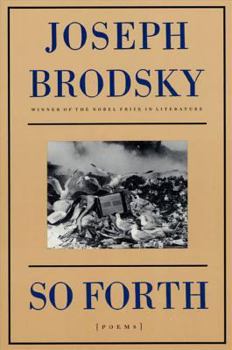So Forth
Select Format
Select Condition 
Book Overview
Joseph Brodsky's last volume of poems in English, So Forth, represents eight years of masterful self-translation from the Russian, as well as a substantial body of work written directly in English.
Format:Paperback
Language:English
ISBN:0374525536
ISBN13:9780374525538
Release Date:March 1998
Publisher:Farrar, Strauss & Giroux-3pl
Length:144 Pages
Weight:0.55 lbs.
Dimensions:0.5" x 5.9" x 8.9"
Customer Reviews
1 rating
Translating the Clouds
Published by Thriftbooks.com User , 21 years ago
A forced exile from Leningrad who went on to live in New York and New England, and teach at Mount Holyoke College, Joseph Brodsky is a serious poet--a brilliant self-translator of his own often brilliant poems--the National Poet Laureate under Clinton--and a man who advocated putting poetry books rather than Bibles in hotes drawers. Well I'm not sure one can find infinite solace or religious consolation proper in this work (which was, if not the last, then among the last of Brodsky's works--with many of the poems written in the mid-nineties shortly before his death in his fifties), one will find moral guidance at its non-preachy best. Like other poets, Brodsky writes of love and loss and the end of the century (one of the half-rhyming translated poems is entitled "fin de siecle"), but he does so with a certain nobility, a certain nongrandiose majesty that lifts him, without any display of effort on his part, to the ranks of the very finest poets ever. Unlike fellow exile Vladimir Nabokov, for example, who seems always to be arguing, thinking about arguing, or making a flourish of having no need to argue, for his posthumous recognition--and whose works, translated by his son, always seem a bit overwritten--Brodsky's poems read fresh and direct in his own translations. And yet, as with the greats of the Russian literary legacy (Chekov's characters are the subject of one poem), we are reminded in reading Brodsky that story-telling and poetry have reached peaks out of the purview of those who cannot appreciate say Pushkin in the original. Observation is a kind of translation, and there is the opposite problem, or rather tendency, of Brodsky's view of America (like Nabokov's) having something strangely quaint and distorted about it--as if strip malls could provide Americans with something more than the generic backdrop against which the exile spins his reveries and measures his memories. It is strange to see the archetypal nonexotic of America made strange through the exile's eyes. We must be grateful for Brodsky for taking the time to translate his own works. In this volume Brodsky laments the passing of time, the aging of lovers, the encroaching of death--he captures long-vanished armies in his poetic net, advises his daughter on where to look for him once he is gone. There is an uncompromising realism in him that is both frightening and refreshing. I thought "Clouds"--"lighter than the body/better than the soul"--one of the best poems ever written--or should I say translated.





